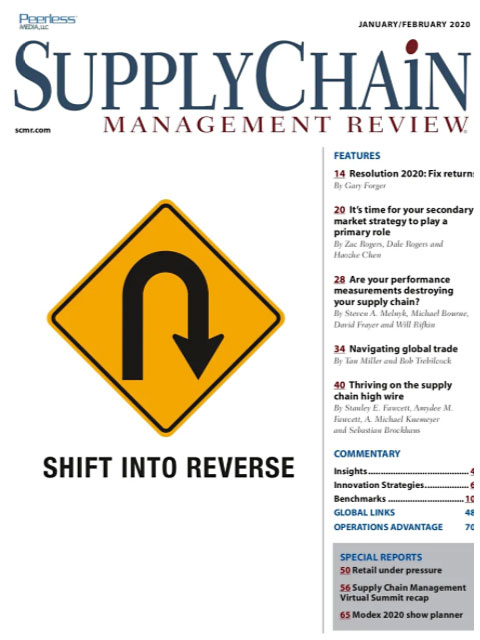Sorry, but your login has failed. Please recheck your login information and resubmit. If your subscription has expired, renew here.
January-February 2020
If the holidays at your household were like most, the gifts were chosen and wrapped with care, and then half were returned in the week after Christmas. Maybe more than half. After all, who among us hasn’t bought four shirts in a variety of sizes and colors with the intent of keeping one and returning three. And why not: Retailers and e-tailers alike have made returns seamless, easy and cheap. At least for the shopper. For the supply chains of the retailer, manufacturer or brand owner, returns are a once-neglected area that is growing into a major focus of supply chain managers who don’t want to see their organizations lose their shirt taking… Browse this issue archive.Need Help? Contact customer service 847-559-7581 More options
When SCMR introduced the first Global Links column nearly a decade ago, the mission was to address common supply chain challenges facing shippers around the world and to highlight some possible solutions. One of the first things we discovered was that transparency was becoming key for multinationals seeking new suppliers.
Fast-forward not quite 10 years, and as we prepare to publish the final column, this observation is as relevant today as it was then. Last year, for instance, HSBC surveyed 8,500 companies in 34 markets to produce its Navigator white paper. Titled “Now, Next and How for Business,” HSBC’s study found that a third of companies are planning to improve the sustainability of their supply chains, and researchers expect that digitization will play an increasingly vital role.
The column also noted in 2019 new evidence that suggests that transparency can also circumvent human rights abuses—even slavery.
According to The Monitor Institute by Deloitte, private sector companies and public sector associations are investing in new tools and solutions to enable them to better oversee their supply chain practices and protect vulnerable workers, while protecting their reputations.

This complete article is available to subscribers only.
Log in now for full access or start your PLUS+ subscription for instant access.
SC
MR
Sorry, but your login has failed. Please recheck your login information and resubmit. If your subscription has expired, renew here.
January-February 2020
If the holidays at your household were like most, the gifts were chosen and wrapped with care, and then half were returned in the week after Christmas. Maybe more than half. After all, who among us hasn’t bought… Browse this issue archive. Access your online digital edition. Download a PDF file of the January-February 2020 issue.When SCMR introduced the first Global Links column nearly a decade ago, the mission was to address common supply chain challenges facing shippers around the world and to highlight some possible solutions. One of the first things we discovered was that transparency was becoming key for multinationals seeking new suppliers.
Fast-forward not quite 10 years, and as we prepare to publish the final column, this observation is as relevant today as it was then. Last year, for instance, HSBC surveyed 8,500 companies in 34 markets to produce its Navigator white paper. Titled “Now, Next and How for Business,” HSBC's study found that a third of companies are planning to improve the sustainability of their supply chains, and researchers expect that digitization will play an increasingly vital role.
The column also noted in 2019 new evidence that suggests that transparency can also circumvent human rights abuses—even slavery.
According to The Monitor Institute by Deloitte, private sector companies and public sector associations are investing in new tools and solutions to enable them to better oversee their supply chain practices and protect vulnerable workers, while protecting their reputations.
SC
MR


Latest Supply Chain News
Latest Podcast

 Explore
Explore
Software & Technology News
- Nine questions are the key to AI success in building resilient supply chains
- Looking back at NextGen 2024
- AI is moving omnichannel closer to the customer
- How technological innovation is paving the way for a carbon-free future in logistics and supply chains
- Körber Supply Chain Software’s Craig Moore says MercuryGate acquisition is about the customer
- Robotic use grows by 10%
- More Software & Technology
Latest Software & Technology Resources

Subscribe

Supply Chain Management Review delivers the best industry content.

Editors’ Picks






